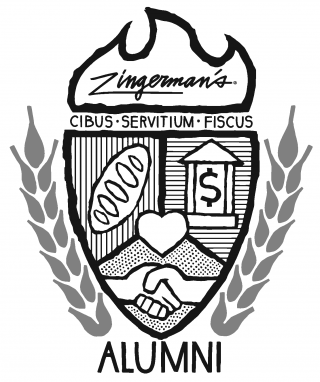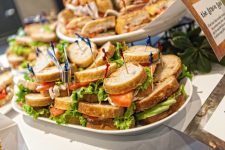Zingerman’s Alumni: Sharing Passion and Great Service
by Dory Fox, University of Michigan PhD Candidate, 2017

One weekend a few years ago in Brookline, Mass., the farmer, filmmaker, and food-trucker, Talia Glass and her husband were getting ready to go for a hike and wanted to buy foods for a picnic lunch. They were thinking of stopping someplace where they could buy cut-to-order cheeses, salads, meats, and bread. Because they are both from Southeast Michigan, “we were both kind of envisioning, that we’d go to Zingerman’s,” the Ann Arbor native said. They realized, though, that there was nowhere nearby that fit the bill.
“I guess you’re gonna have to start the Zingerman’s of Brookline,” Glass’s husband joked.
But this idea stuck with her. She grew up eating at the Zingerman’s deli and later worked at the Deli and at Cornman Farms. After several years in the Boston area, the idea for Allium Market and Café crystalized. Of course, for Glass, like for other Zingerman’s alumni who have started their own businesses, the goal has not been to start a carbon copy of Zingerman’s. Instead, Glass emulates the ethos of passion for food, commitment to employees, and creating community through education, eating, and drinking.
When Allium opens in the fall, Glass will join a network of people who once worked at Zingerman’s—in roles from sandwich runners to farmers to cheesemongers to buyers—and now have carved out a place for themselves in the food industry. Some of these Zingerman’s alumni, like Glass, have done so all around the country. As near as Detroit, you can find the fingerprints of Lucy Carnaghi, who co-founded the beloved diner Rose’s Fine Foods and will be opening a new restaurant, Wilda later this summer; and as far as the west coast, the California Artisan Cheese Guild has named Zingerman’s alum and cheesemonger Anthea Stolz its first-ever executive director.
Yet an even more visible and remarkable phenomenon of Zingerman’s alumni exists locally within the town of Ann Arbor, where many Zingerman’s alumni have started businesses and have enriched the local food scene immensely.
Thad Gillies, the co-owner and chef at Logan, worked at Zingerman’s for a total of ten years, eventually as the deli chef, before opening the white-tablecloth restaurant, which he co-owns. In the middle of his tenure at Zingerman’s, he spent a two-year stint in New York restaurants while his wife was in graduate school there. But as a true Midwesterner, he always knew that he’d want to come back to Michigan. Having a small restaurant in a place like Ann Arbor has also shaped how he runs his business. For returning customers, Logan keeps an extensive database of what foods and wines patrons have tried, what they like and don’t like.
“We go with that,” Gillies said. “And then we push them. Say, ‘we know you like this, you should try this now. Just try it.’”
The unique character of Ann Arbor also shaped how Eric Farrell imagined his business, The Bar at 327 Braun Court. He co-founded The Bar in 2011 after about a decade of dreaming up a bar that would bring the cocktail movement to Ann Arbor. In that time, he was working as a buyer at Zingerman’s. In his vision for what became The Bar, Farrell hoped for an eclectic clientele.
“I said, I want a 23-year old kid with a Mohawk sitting next to two guys in their late fifties in business suits.”
Visiting businesses like The Bar makes it apparent that Zingerman’s alumni working in and around Ann Arbor constitute a network of friends and collaborators. Farrell said was first introduced to craft cocktails and the cocktail movement around the year 2000, on visits to New York City with close friend and Zingerman’s Mail Order Managing Partner Mo Frechette. Now Farrell’s staff includes other Zingerman’s alumni.
The same is true at Spencer, Steve Hall and Abby Orlitzky’s restaurant that’s been serving Ann Arborites cheeses, wines, and locally sourced food since 2015. Hall worked for many years at Zingerman’s. Yet even after he left Ann Arbor for San Francisco, Zingerman’s played an instrumental role in his personal and professional life: according to Hall, a loaf of Zingerman’s rye bread was key in winning over Orlitsky, who coincidentally had learned about Zingerman’s food and business philosophy as a chef in fine restaurants in San Francisco.
The pair knew that they wanted to start a restaurant together, and decided to move back to Hall’s native Michigan. They’d initially imagined opening a place in Detroit, but like Gillies, believed that founding their restaurant in Ann Arbor created the opportunity to build a community with consistent customers who could return, try new things, and learn. The area’s agricultural bounty has turned out to make a great difference for Spencer. The restaurant’s rotating menu and the small size of operation also means flexibility in this regard. It means that they can accommodate new or unexpected produce at the drop of a text message from a farmer.
“There are such good farms here—small farms, big farms, organic farms, orchards,” Hall said. “We love it because there are so many farmers who will just say, ‘what do you want us to grow you?’ So that is another really huge resource for us.”
Hall—like many of these business owners—emphasized the importance of passion in his line of work. This was something that he observed as an employee at Zingerman’s and carries on to this day.
“It’s that sharing of passion, that sharing of knowledge that is the big difference, it makes food taste better, it makes the experience better, and it makes people happier at their jobs,” he said.
Glass also noted how much it mattered to be the kind of manager that “would go the extra mile for employees” in addition to caring for customers. This was something she both practiced and experienced working at Zingerman’s. She recalled football Saturdays early on in her time at the deli when founding partner Ari Weinzweig would be working right alongside her, helping to run sandwiches.
This sentiment was echoed by Gabrielle Hamilton, the award-winning chef of Prune in Manhattan’s East Village, and bestselling author of Blood, Bones & Butter. In the 90s Hamilton cooked family dinner at the Zingerman’s Bakehouse, while pursuing a graduate degree in fiction writing at the University of Michigan. When she was there she observed and admired the management style of Frank Carollo, co-managing partner at the Bakehouse.
“I thought he was the model of an employer, I would definitely clock his work style,” Hamilton said. “Always finding the positive and correcting the mistake but in the most positive way, not a berater but an uplifter. And that I found that rare, wherever you go.”
Farrell described the culture at Zingerman’s simply as, “There’s something awesome about a place that believes in what it’s doing.”
“When I was there, I always felt like I was a part of something special,” he said, “which is not something I think a lot of people can say.”
If you are an alum of Zingerman’s, we invite you to join our Facebook Group!




Zingerman’s Art for Sale